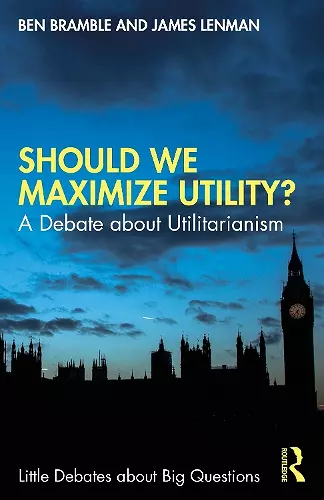Should We Maximize Utility?
A Debate about Utilitarianism
Ben Bramble author James Lenman author
Format:Paperback
Publisher:Taylor & Francis Ltd
Published:27th Mar '25
Currently unavailable, and unfortunately no date known when it will be back
This paperback is available in another edition too:
- Hardback£145.00(9781032291055)

Utilitarianism directs us to act in ways that impartially maximize welfare or utility or at least aim to do that. Some find this view highly compelling. Others object that it has intuitively repugnant results, that it condones evildoing and injustice, that it is excessively imposing and controlling, that it is alienating, and that it fails to offer meaningful, practical guidance.
In this ‘Little Debates’ volume, James Lenman argues that utilitarianism’s directive to improve the whole universe on a cosmic time scale is apt to lead it down a path of imperious moral overreach. The project, he further maintains, ultimately shipwrecks on an extreme lack of epistemic humility in framing the determinants of what is morally right and wrong beyond the limits of what we can ever hope to know. Utilitarianism thus leaves us morally clueless. In contrast, Ben Bramble seeks to develop and defend an original form of utilitarianism, less vulnerable than other, more familiar versions to a number of important objections, including those raised by Lenman. He aims to avoid such unappealing results by presenting it as a claim about what we have the most reason to do, and not as a theory of right action, which Bramble urges we should understand quite differently by reference to what would motivate virtuous people.
Key Features:
- Focuses on one of the dominant ethical theories debated by moral philosophers today
- Clearly written, free of jargon and technicality, and highly accessible to students
- Addresses questions of great importance to anyone wishing to grow in understanding of human moral life
- Provides a glossary of key terms highlighted in bold as well as a bibliography for further reading
- Important issues discussed include: welfare; value; right action; virtue; impartiality; obligations to non-human animals; the badness of human extinction; the happiness of future people; the ethics of climate change; the long term future; and the moral significance of the limits to what we can know. <
"Though much excellent work has been done on understanding utilitarianism itself, and on both the attractions of and problems with it, the fundamental debate remains as intractable as ever. The state-of-the-art essays that follow bring out clearly how much progress has been made since... the early utilitarians, as well how careful and imaginative reflection can take us yet further in understanding the issues at stake and possible resolutions of them."
-Roger Crisp, from the Foreword
"Though much excellent work has been done on understanding utilitarianism itself, and on both the attractions of and problems with it, the fundamental debate remains as intractable as ever. The state-of-the-art essays that follow bring out clearly how much progress has been made since . . . the early utilitarians, as well how careful and imaginative reflection can take us yet further in understanding the issues at stake and possible resolutions of them."
Roger Crisp, from the Foreword
ISBN: 9781032291048
Dimensions: unknown
Weight: 450g
224 pages